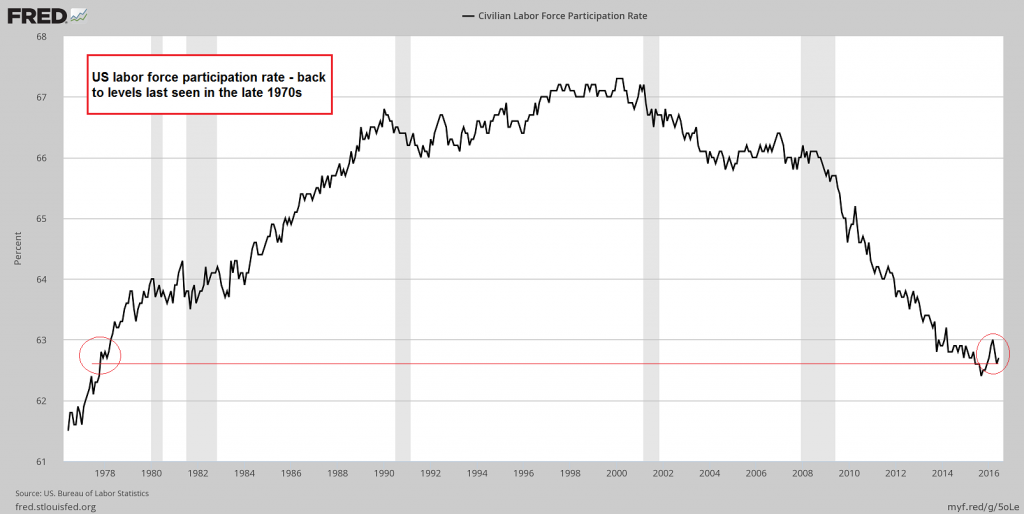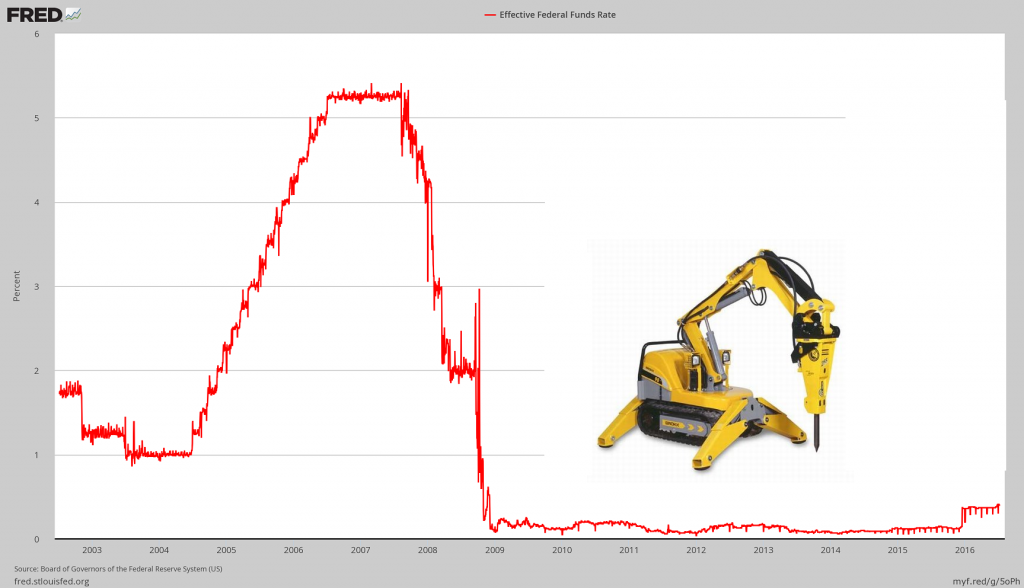Meaningless Noise BALTIMORE – The Dow rose 250 points on Friday… putting it back near its all-time high. A “blow-out jobs report” was said to be the inspiration. Oh my… so many dots.. so little time. Friday’s jobs report said that 278,000 Americans found work in June – up from 11,000 in May. This was considered such good news that investors rushed to buy stocks. At least, that was the line taken by the mainstream financial press. But a single month’s number is meaningless noise. Even honest numbers should be disregarded; they just don’t have any useful information. The feds’ numbers are worse. They are lies – statistical confections that so heavily sugarcoat the data they practically give you diabetes. Excluding all the “invisible men”, the jobs report was great! Above one of the modern-day BLS desaparecidos having a smoke. Image credit: Greg Nicotero US civilian labor force participation rate In a protracted economic slump – such as we’ve been in since 2007 – people give up. Then, if they stay out of the workforce for a few years, it can be very hard to get back in. The statisticians do not merely ignore these people; they disappear them. Officially, the jobless rate is under 5% today, just as it was in 2001. That implies that there are 20 times as many people with jobs as without them.
Topics:
Bill Bonner considers the following as important: blow-out jobs report, Central Banks, Debt and the Fallacies of Paper Money, Featured, newslettersent, On Economy, On Politics, Robots are taking over
This could be interesting, too:
Nachrichten Ticker - www.finanzen.ch writes Die Performance der Kryptowährungen in KW 9: Das hat sich bei Bitcoin, Ether & Co. getan
Nachrichten Ticker - www.finanzen.ch writes Wer verbirgt sich hinter der Ethereum-Technologie?
Marc Chandler writes March 2025 Monthly
Mark Thornton writes Is Amazon a Union-Busting Leviathan?
Meaningless NoiseBALTIMORE – The Dow rose 250 points on Friday… putting it back near its all-time high. A “blow-out jobs report” was said to be the inspiration. Oh my… so many dots.. so little time. Friday’s jobs report said that 278,000 Americans found work in June – up from 11,000 in May. This was considered such good news that investors rushed to buy stocks. At least, that was the line taken by the mainstream financial press. But a single month’s number is meaningless noise. Even honest numbers should be disregarded; they just don’t have any useful information. The feds’ numbers are worse. They are lies – statistical confections that so heavily sugarcoat the data they practically give you diabetes. |
|
US civilian labor force participation rateIn a protracted economic slump – such as we’ve been in since 2007 – people give up. Then, if they stay out of the workforce for a few years, it can be very hard to get back in. The statisticians do not merely ignore these people; they disappear them. Officially, the jobless rate is under 5% today, just as it was in 2001. That implies that there are 20 times as many people with jobs as without them. But if you take the number of people with jobs today and multiply by 20, you come way short of the number of people of working age. Allowing for the same ratio of non-working spouses and shiftless layabouts as there were 15 years ago, there are about 15 million people missing. What happened to them? They are invisible. They tend to live in fly-over country and don’t make campaign contributions. They don’t bid for federal contracts or write angry letters to the editor. They may as well not exist. But watch out: They may not be simply the worn-out losers of the “old” economy. They may be showing us what’s in store for the rest of us. |
|
Rise of the Robots“Robots are taking over,” says a friend. “They began by doing the simplest, lowest wage jobs. But they were competing with very low-paid workers. So employers wouldn’t pay much for them. But now they’re getting a lot more sophisticated. This is where it gets interesting.” “When you buy a robot to replace a human employee, what you’re really doing is capitalizing the cost of the employee. Let’s say an employee earns $50,000 a year. You have to figure that you spend another $25,000 a year on benefits, a personnel office, lawsuits, counseling, management issues, health care, holidays, a desk, a phone. So you have a total cost of $75,000. And he’s working only eight hours a day, five days a week. “In a normal world, with a cost of capital at 5%, and an amortization period of 10 years for the robot, you could afford to spend about half a million (I’m not doing the math. I’m just guessing). “But here’s the point: As you go up the income ladder, you can spend a lot more. If you can replace a guy who earns $100,000 a year, you can pay $1 million… and so forth.” |
|
Dumping WorkersAs robots get more sophisticated, it’s a matter of time until most people who do routine and not-so-routine work will be replaced. Robots don’t complain when they get pinched on the derriere by a frisky manager. They work nights without grumbling or overtime. They don’t call in sick. They don’t care if there’s a home game. They don’t make excuses when they run over an elderly blind woman with the company truck. “And guess what?” continued our friend. “The feds say they are stimulating the economy and aiding employment with their ultra-low rates. But what they’re really doing is helping robots find jobs. “As the cost of capital goes down, the relative cost of capital, as opposed to labor, also goes down. You can’t capitalize an employee. At least, not since slavery was abolished. “But the real cost of a machine goes down when the cost of funds goes down. It’s a capital investment. So, when the cost of capital goes down to zero, a company with access to that cheap – or even free – money can afford to pay almost an infinite amount of money to get rid of its employees. “Zero-interest-rate policy is really a full robot employment program.” |
Charts by St. Louis Federal Reserve Research
Chart and image captions by PT
The above article originally appeared at the Diary of a Rogue Economist, written for Bonner & Partners.




